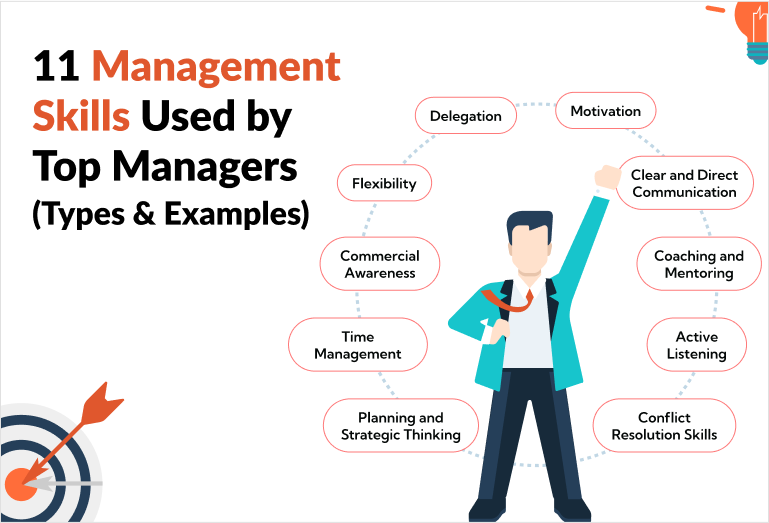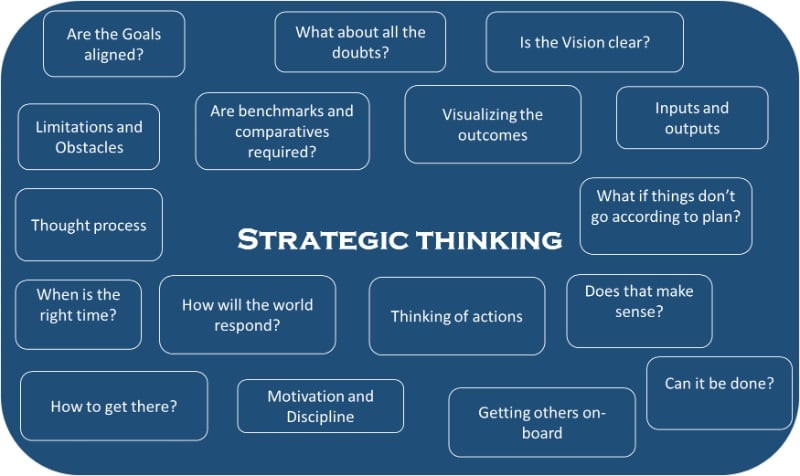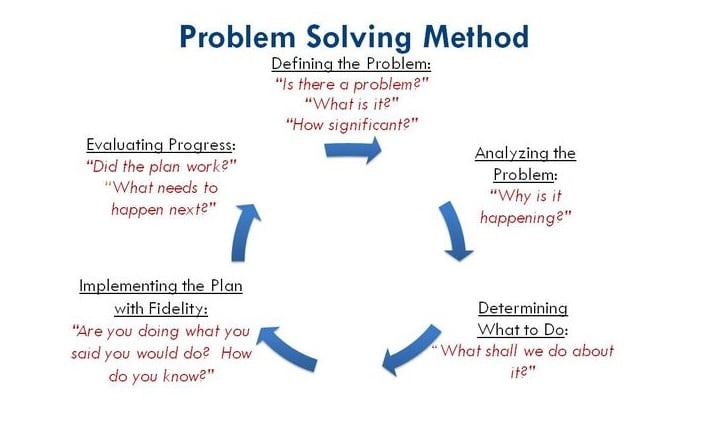

The difference between a regular manager and a successful one is not necessarily knowledge but skillsets. Being an effective manager requires specific management skills to manage remote teams successfully.
Developing management skills is essential not only for managers and administrators but for individuals and employees. Even if you are currently not managing a team but have a management role in your career’s vision, there’s no harm in learning these vital skills now.
This article covers 11 must-have management skills that help you motivate, manage, and lead teams successfully.
Let’s get started.
Management skills are vital elements that determine the success or failure of a manager. They are vital attributes that help a manager perform leading, scheduling, planning, motivating, organizing, budgeting, and problem-solving roles.
A manager without the right management skills is like a farmer without tools. These two individuals can’t perform their duties effectively because they don’t have the complete toolset.
You may know the theories and have multiple degrees and certifications in management, but without skills like conflict resolution and delegation, you can’t manage a team.

Let's take a quick look at the various types of management skills that are relevant in the business world.
Technical skills are specialized knowledge and expertise a manager uses to achieve organizational objectives. You can also call them hard skills.
This skill set involves understanding and operating machines, software, production tools, and pieces of equipment. They include techniques and strategies required to boost sales, design products, and complete projects successfully.
Conceptual skills give managers an accurate worldview of how things operate in the organization. Abstract thinking and idea formulation are vital aspects of these skills because they encourage different types of innovations.
With these skills, managers can seamlessly analyze a concept, identify problems, and create contingencies and solutions. A successful manager should develop conceptual skills because it's a great advantage to the organization.
Human resources are valuable in every organization, and work cannot move forward without them. Good managers know the value of every individual on their team. With the proper application of interpersonal skills, they unlock new potentials in them.
People management skills involve motivating, leading, interacting, and relating with others in a work environment.

There are many common management skills (hard and soft skills) necessary for top managers and future leaders. Here are the must-have 11 management skills.
Planning and strategic thinking are vital managerial skills with the potential to alter the course of things in an organization.
A skilled manager is a great planner. Planning skills help managers to structure organizational activities in line with the set goals without spending beyond the allocated resources. Plans are more effective when the manager can do things strategically.
You can’t achieve your business objectives without strategic thinking. As a strategic thinking manager, innovations are your area of expertise. Create new and improved ways to execute your plans and achieve organizational goals.

They are vital managerial skills that a good manager must possess. Leaders are responsible for identifying and solving problems daily.
Problem-solving is a key management skill that requires insight and precision. Without this skill, a manager can’t be effective.
As a manager, you will have to make pleasant and unpleasant decisions every day. These decisions can be towards your team members or concerning the work at hand. Ensure you are unbiased and make knowledgeable choices.
Thinking on your feet when problems arise may be difficult at the initial stage, but once you master the art, you can make fast but accurate decisions.
Creative thinking aids the problem-solving and decision-making process. Certain problems require you to find creative solutions and make quick decisions to complete a task or meet a business goal.

Commercial awareness is the knowledge about what your business earns, what its customers want, and what challenges are in different business areas.
Most graduates don’t have commercial awareness, and this skill is in high demand by most employers. If you want to attain a management position in your organization, you need this skill.
This skill gives you accurate knowledge of the market where your business operates and what factors determine its success or failure.
Great managers are experts in commercial awareness with insight into political and economic issues, competitors, the organization's missions, and overall goals. Ensure you develop this skill to help your business stay ahead of any issues in its environment.
There is a limit to how far technical know-how can take you. The ability to communicate effectively with another individual is a vital management skill everyone needs.
Communication skills are vital for leadership positions, especially managers. Your team members will produce better results when there is clear communication between both parties.
When executing tasks or projects, communicate deadlines, make corporate announcements, give constructive comments, answer inquiries, and conduct discussions with your team.
Motivating employees is easier when a manager uses established communication channels to convey vital information. Not all communication channels are ideal for passing certain information. Discover which one best suits the information you want to convey and use it.
Examples of common communication channels include face-to-face, phones and electronics, virtual and augmented reality, and conference calls.
If your communication skills are lacking, you can sharpen them via public speaking groups. Note that communication is a two-way channel. Encourage your team members to drop feedback and listen actively when they are sharing.

Great leaders are excellent listeners. It takes more effort to listen than to talk. There is a limit to how much information you can acquire from a team member if you do not listen actively.
Don't confuse hearing with active listening, they are not the same. Active listening involves paying close attention to the details and vital cues during a conversation.
This skill benefits the manager and other employees because both parties can learn and make definite changes to achieve business goals.
When you ask a question, ensure you pay full attention and have an open mind to suggestions. Employees can easily detect if you don't listen to their opinions, and they may choose not to speak up in subsequent meetings.
Good managers understand the importance of listening to their subordinates. They can learn new ideas and suggestions that might have never crossed their minds.
If your subordinates know you are an active listener and you value their opinions, they will always share their ideas with you. Active listening is a vital part of your managerial role.
You can master active listening through practice. Ensure you are not always in a hurry to talk and be conscious of your performance in every conversation. After speaking, wait for others to share their opinions.
Micromanaging will affect your team’s work and reduce productivity. Delegation is one the most common management skills that help to achieve tasks faster and more effectively.
As a manager, don't do everything yourself. Don’t let the fear of being perceived as weak prevent you from exercising your delegation skills. You must learn to believe in your subordinates and assign them vital roles to ensure the workflow moves smoothly.
Not many managers know how to delegate tasks effectively to the right team members. Some give responsibility to the wrong people resulting in bad results.
You can avoid this outcome by knowing your team’s potential and assigning tasks to individuals whose skills and expertise fit the roles. Delegate strategically and not based on emotions or impulses.
Having good delegation skills is a must-have for every manager. Without this skill, you will waste time and resources and will slow productivity.
Good management skills are the hallmark of a successful organization. Success without a successor is a failure. Your management role is incomplete without the people you are coaching and mentoring.
Good leaders play the coaching and mentoring role to their subordinates. Remember, every great athlete has a coach that saw their potential and helped them develop it. You can do the same with those under you.
Help your mentees to develop the right skills through practical experience and theory. Coaching and mentoring encourage productive relationships because it involves training and building confidence, skills, and critical thinking.
Your managerial role goes beyond being in charge and giving orders. You have a responsibility to impact those around you with knowledge, build trust, and motivate them.
Mentoring makes delegation seamless because you can trust your mentees to handle responsibilities based on their training.
If you want to be a great coach and mentor, you have to work on your mindset first. How do you see your team members? Are they working for you or with you?
See them beyond ordinary subordinates, recognize their potential, and help them acquire the skills needed to be effective managers.
Good management and leadership skills take time to master. Be patient with the employees you are mentoring. Remember, “Rome was not built in a day.”
You can train them by getting your hand dirty and showing them the ropes personally. People learn better by observation rather than through constant correction.
How motivated are your team members? This question determines the degree of productivity in your organization.
For example, a well-motivated team will have no issues completing tasks and meeting deadlines before the allocated time. On the other hand, if your senior and frontline staff are uninspired, work will move at a slow pace.
Your leadership qualities are not complete without motivating your employees to achieve the set goal. Motivation helps to produce a desired behavior and attitude towards work. You will have fewer complaints or fights when your team is motivated.
There is no best way to motivate your employees. What will work depends on factors like company policy, team culture, and team personalities. Discover what motivates your team and use this knowledge to create a conducive work environment.
For example, praising your employees when they carry out their tasks on time is a motivating factor. You can offer rewards and special recognition to team members that are performing well.
Conflicts happen in the work environment because people don't always agree. If you leave conflict to grow unchecked, it can affect your team morale and productivity. People can't work properly where there is tension.
Conflict resolution is a leadership role you can’t delegate. While addressing issues among your employees, ensure you are not biased. Emotional intelligence will help you navigate the process without siding with one party over the other for a quick resolution.
Your ability to see who is at fault and help both parties recognize the need to resolve their differences is the core of this skill. You must be confident in your ability to solve these issues. Everything depends on you and the way you address the issues at hand.
Take every word each party says seriously, carry out thorough investigations, and make your decisions based on what you discover. Other management skills like communication and problem-solving work hand-in-hand to make this process effective.
Time management skills help managers to execute projects within the set time. As a manager, understand that time is a crucial resource you must use efficiently because if you waste it, you can not get it back.
In project management, deadlines are essential to the project manager and each team member. Failure to complete tasks at specific time frames affects the whole project and results in losses.
Managers must learn how to manage time effectively to avoid missing out on deadlines. Learn how to schedule tasks with time limits and monitor employees to ensure they stick to them. Have a to-do list for each task to ensure you stay on course and prioritize urgent tasks.
Time management skills are essential for maintaining a healthy work-life balance. It’s interesting how managers can be masters of time management in the office space but suck at it in their personal life.
Work is not everything. Learn how to manage your non-work hours effectively so you can achieve your personal goals.

The business world has experienced different kinds of changes, both positive and negative. Some of these changes include ways of executing tasks, leadership changes, natural disasters, and more.
Your perception of the changes determines how flexible you will operate as a manager. By being flexible, you can rise above these changes and achieve your set goals.
After recognizing the changes in your work environment, it's wise to make some changes to fit into the new scheme. Having contingencies will prevent unexpected disasters and losses in the business.
As a flexible leader, recognize that there will always be changes. Your job is to create multiple ways to solve problems and get your desired results. Being inflexible is dangerous to the progress of your team and the organization.